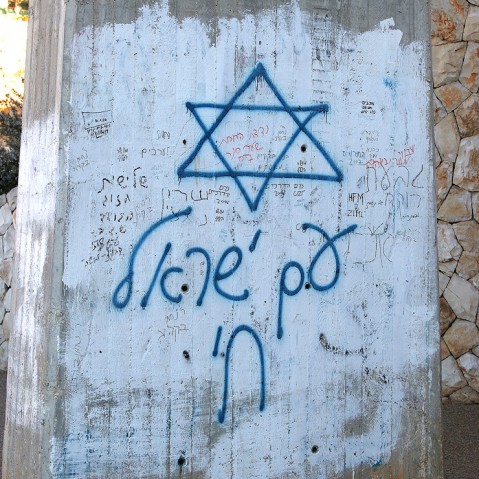 To download a printable pdf version of this article (on one page) click here.
To download a printable pdf version of this article (on one page) click here.We like to think that the story of Chanukah chronicles the good guys against the bad: the righteous Jews against the evil Greeks. While in some ways that's true, it's also s a gross oversimplification. In many ways, the story of Chanukah tells the tragic tale of Jew vs. Jew; secularist against religionist; those who remained faithful to Torah and halachah against a powerful group that had abandoned the traditional Jewish way of life. Examined in this light, Chanukah takes on a greater sense of urgency as we watch the two major camps in Israel – the religious and the secular – grow increasingly farther apart from each other. (Watching the competing protests over the character and nature of Yerushalayim on one hand, and the growing tension over the question of following orders in the army, it's easy to see how history could repeat itself, God forbid.)
While the essence of the miracle of Chanukah focuses on the war against the Greeks and the miracle of the oil in the Beit Hamikdash, Chazal left us clues to remind us about the underlying conflict that precipitated the terrible war.
When we examine the very brief mention of Chanukah found in the Gemara (Shabbat 21b – 22b), we encounter an interesting anomaly. (I've numbered the different subjects to make my point clear.)
Sandwiched between two short passages relating to specific halachot of lighting ((1) the height and (3) placement of the Chanukah lamp), the Gemara includes a seemingly unrelated Midrash. Why did Chazal record the familiar Midrash about the well into which the brothers threw Yosef in between two halachot about Chanukah? Also, can we connect this Midrash to the rules about where to place the Chanukah lamp?אמר רב כהנא, דרש רב נתן בר מניומי משמיה דרבי תנחום נר של חנוכה שהניחה למעלה מעשרים אמה - פסולה, כסוכה וכמבוי. ואמר רב כהנא, דרש רב נתן בר מניומי משמיה דרב תנחום: מאי דכתיב +בראשית לז+ והבור רק אין בו מים. ממשמע שנאמר והבור רק איני יודע שאין בו מים? אלא מה תלמוד לומר אין בו מים - מים אין בו, אבל נחשים ועקרבים יש בו. אמר רבה: נר חנוכה מצוה להניחה בטפח הסמוכה לפתח. והיכא מנח ליה? רב אחא בריה דרבא אמר: מימין, רב שמואל מדפתי אמר: משמאל. והילכתא - משמאל, כדי שתהא נר חנוכה משמאל ומזוזה מימין.1. Said Rav Kahana: Rav Natan bar Minyomi taught in the name of Rabbi Tanchum: A Chanukah lamp placed above the height of twenty amot is invalid. 2. And said Rav Kahana: Rav Natan bar Minyomi taught in the name of Rabbi Tanchum: What is the meaning of the verse: "And the well was empty, it contained no water"? Since it says "the well was empty" did I not know that it contained no water? Rather, what does "it contained no water" teach? [The well] had no water, but it contained snakes and scorpions. 3. Said Rabbah, it is a mitzvah to place the Chanukah lamp in the tefach adjacent to the doorway. And where should he place it? Rav Acha the son of Ravva said: to the right. Rav Shmuel from Difti said: to the left. And the halachah is to the left, so that the Chanukah lamp is on the left, and the mezuzah on the right.
When we examine the language Chazal utilize in the Midrash about Yosef's well, we find a subtle but critical Chanukah lesson. In addition to the Midrash about the well in the Gemara, the Midrash records a different, less-known teaching (Midrash Agadah 37) about that well:
Yosef's brothers threw him into two "pits". They first cast him into the actual water-well, empty as it was. But then, by selling him into slavery headed towards Egypt, they cast him into a far larger well: the empty pit of Egypt. Yet, this pit was devoid not of water, but of the Torah and spirituality that Yosef learned from his father at home. The Midrash notes a critical message about the absence of Torah. Lack of Torah is not benign. Rather, that lack of Torah and spirituality itself presented a danger to Yosef. The absence of Torah is not a vacuum, open to both positive and negative opportunities. Rather, the very lack of Torah in the well necessitates the fact that "snakes and scorpions" dwelled in that well instead. A place without Torah is never innocuous. The lack of Torah spells danger for Yosef, and for us, his descendants, as the void is filled not by the positives of Hellenism: the philosophy, science and progress, but by its dangers: hedonism, materialism and self-gratification.והבור רק אין בו מים [אין בו דברי תורה]. ואין מים אלא תורה, שנאמר הוי כל צמא לכו למים (ישעי' נה א), מלמד שמרוב הצרה שכח תלמודו"And the well was empty, it contained no water" – [it contained no words of Torah]. For "water" can only refer to Torah, as it is written, "Let all who thirst go to the water." (Isaiah 55:1). This teaches us that out of great anguish [Yosef] forgot his [Torah] studies.
This could help us understand the very next passage in the Gemara: ideally, one should place the menorah not in the window, but in the doorway – on the left-hand side (when entering). In this way, we surround our doorway with mitzvot that represent the Torah: the powerful words of Shema in the mezuzah on the right, and the light of Chanukah representing the spirituality of Judaism on the left.
Where does your family light your Chanukah candles? For the past several hundred years, we lit our candles in the window, not because we wanted to but because we had to. Too many generations were forced to keep the light of Chanukah to ourselves, shut in from the dangers (both literal and spiritual) of the outside world. But today things are different, both here in Israel and across the Diaspora. We no longer fear to light our candles in the public square. Our doors today are open. We should follow the ruling of the Shulchan Aruch and light not in the window, but with open doors.
And when we do, there can be no more powerful message about the way we relate to the outside world. Our doorways represent the portal between the insularity of the Jewish home and the "well" of the Western world. What values do we permit to pass through that portal? Are they informed by the mitzvot of Chanukah and mezuzah? The moments we spend lighting our candles this Chanukah present a perfect opportunity to contemplate these crucial questions.

















